
If we want to find a stock that could multiply over the long term, what are the underlying trends we should look for? In a perfect world, we'd like to see a company investing more capital into its business and ideally the returns earned from that capital are also increasing. Put simply, these types of businesses are compounding machines, meaning they are continually reinvesting their earnings at ever-higher rates of return. In light of that, when we looked at APRO (KOSDAQ:262260) and its ROCE trend, we weren't exactly thrilled.
Return On Capital Employed (ROCE): What Is It?
For those who don't know, ROCE is a measure of a company's yearly pre-tax profit (its return), relative to the capital employed in the business. The formula for this calculation on APRO is:
Return on Capital Employed = Earnings Before Interest and Tax (EBIT) ÷ (Total Assets - Current Liabilities)
0.025 = ₩3.2b ÷ (₩374b - ₩246b) (Based on the trailing twelve months to September 2024).
So, APRO has an ROCE of 2.5%. Ultimately, that's a low return and it under-performs the Electrical industry average of 7.7%.
See our latest analysis for APRO

Historical performance is a great place to start when researching a stock so above you can see the gauge for APRO's ROCE against it's prior returns. If you're interested in investigating APRO's past further, check out this free graph covering APRO's past earnings, revenue and cash flow.
What Does the ROCE Trend For APRO Tell Us?
On the surface, the trend of ROCE at APRO doesn't inspire confidence. To be more specific, ROCE has fallen from 11% over the last four years. However, given capital employed and revenue have both increased it appears that the business is currently pursuing growth, at the consequence of short term returns. And if the increased capital generates additional returns, the business, and thus shareholders, will benefit in the long run.
On a side note, APRO's current liabilities have increased over the last four years to 66% of total assets, effectively distorting the ROCE to some degree. Without this increase, it's likely that ROCE would be even lower than 2.5%. What this means is that in reality, a rather large portion of the business is being funded by the likes of the company's suppliers or short-term creditors, which can bring some risks of its own.
The Bottom Line On APRO's ROCE
In summary, despite lower returns in the short term, we're encouraged to see that APRO is reinvesting for growth and has higher sales as a result. However, despite the promising trends, the stock has fallen 65% over the last three years, so there might be an opportunity here for astute investors. So we think it'd be worthwhile to look further into this stock given the trends look encouraging.
Since virtually every company faces some risks, it's worth knowing what they are, and we've spotted 5 warning signs for APRO (of which 3 make us uncomfortable!) that you should know about.
While APRO isn't earning the highest return, check out this free list of companies that are earning high returns on equity with solid balance sheets.
New: Manage All Your Stock Portfolios in One Place
We've created the ultimate portfolio companion for stock investors, and it's free.
• Connect an unlimited number of Portfolios and see your total in one currency
• Be alerted to new Warning Signs or Risks via email or mobile
• Track the Fair Value of your stocks
Have feedback on this article? Concerned about the content? Get in touch with us directly. Alternatively, email editorial-team (at) simplywallst.com.
This article by Simply Wall St is general in nature. We provide commentary based on historical data and analyst forecasts only using an unbiased methodology and our articles are not intended to be financial advice. It does not constitute a recommendation to buy or sell any stock, and does not take account of your objectives, or your financial situation. We aim to bring you long-term focused analysis driven by fundamental data. Note that our analysis may not factor in the latest price-sensitive company announcements or qualitative material. Simply Wall St has no position in any stocks mentioned.
About KOSDAQ:A262260
Moderate unattractive dividend payer.
Market Insights
Community Narratives



